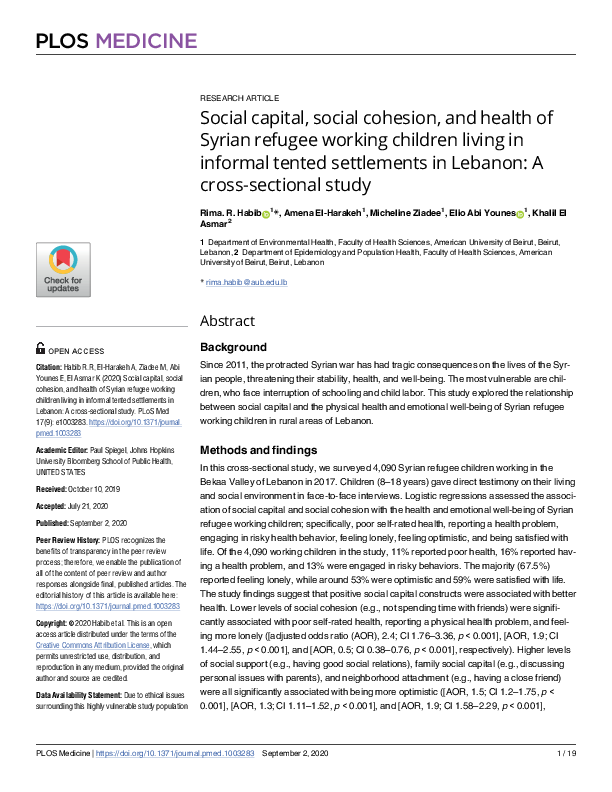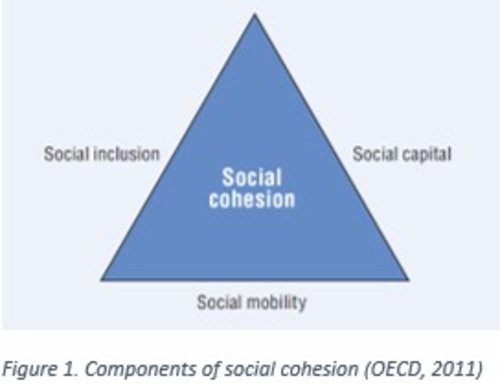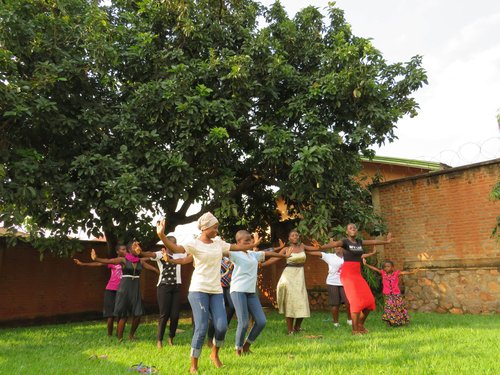Social capital, social cohesion, and health of Syrian refugee working children living in informal tented settlements in Lebanon: A cross-sectional study
Key facts
Connectedness
Youth
Summary
Background
Since 2011, the protracted Syrian war has had tragic consequences on the lives of the Syrian people, threatening their stability, health, and well-being. The most vulnerable are children, who face interruption of schooling and child labor. This study explored the relationship between social capital and the physical health and emotional well-being of Syrian refugee working children in rural areas of Lebanon.
Methods and findings
In this cross-sectional study, we surveyed 4,090 Syrian refugee children working in the Bekaa Valley of Lebanon in 2017. Children (8–18 years) gave direct testimony on their living and social environment in face-to-face interviews. Logistic regressions assessed the association of social capital and social cohesion with the health and emotional well-being of Syrian refugee working children; specifically, poor self-rated health, reporting a health problem, engaging in risky health behavior, feeling lonely, feeling optimistic, and being satisfied with life. Of the 4,090 working children in the study, 11% reported poor health, 16% reported having a health problem, and 13% were engaged in risky behaviors. The majority (67.5%) reported feeling lonely, while around 53% were optimistic and 59% were satisfied with life. The study findings suggest that positive social capital constructs were associated with better health. Lower levels of social cohesion (e.g., not spending time with friends) were significantly associated with poor self-rated health, reporting a physical health problem, and feeling more lonely ([adjusted odds ratio (AOR), 2.4; CI 1.76–3.36, p < 0.001], [AOR, 1.9; CI 1.44–2.55, p < 0.001], and [AOR, 0.5; CI 0.38–0.76, p < 0.001], respectively). Higher levels of social support (e.g., having good social relations), family social capital (e.g., discussing personal issues with parents), and neighborhood attachment (e.g., having a close friend) were all significantly associated with being more optimistic ([AOR, 1.5; CI 1.2–1.75, p < 0.001], [AOR, 1.3; CI 1.11–1.52, p < 0.001], and [AOR, 1.9; CI 1.58–2.29, p < 0.001], respectively) and more satisfied with life ([AOR, 1.3; CI 1.01–1.54, p = 0.04], [AOR, 1.2; CI 1.01–1.4, p = 0.04], and [AOR, 1.3; CI 1.08–1.6, p = 0.006], respectively). The main limitations of this study were its cross-sectional design, as well as other design issues (using selfreported health measures, using a questionnaire that was not subject to a validation study, and giving equal weighting to all the components of the health and emotional well-being indicators).
Conclusions
This study highlights the association between social capital, social cohesion, and refugee working children’s physical and emotional health. In spite of the poor living and working conditions that Syrian refugee children experience, having a close-knit network of family and friends was associated with better health. Interventions that consider social capital dimensions might contribute to improving the health of Syrian refugee children in informal tented settlements (ITSs).




